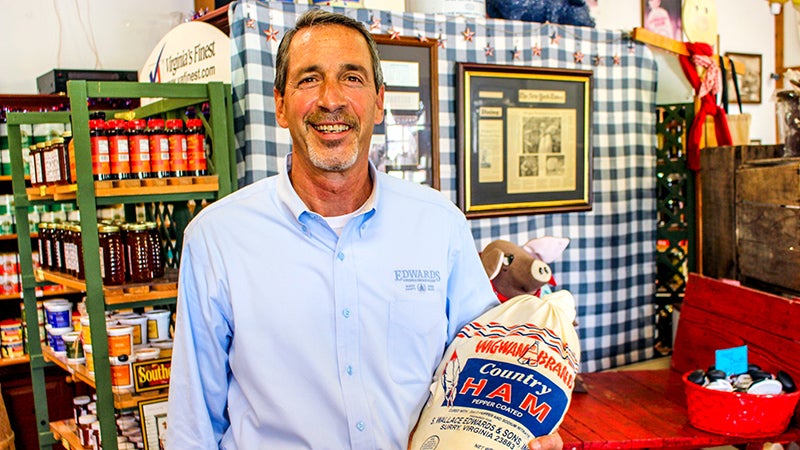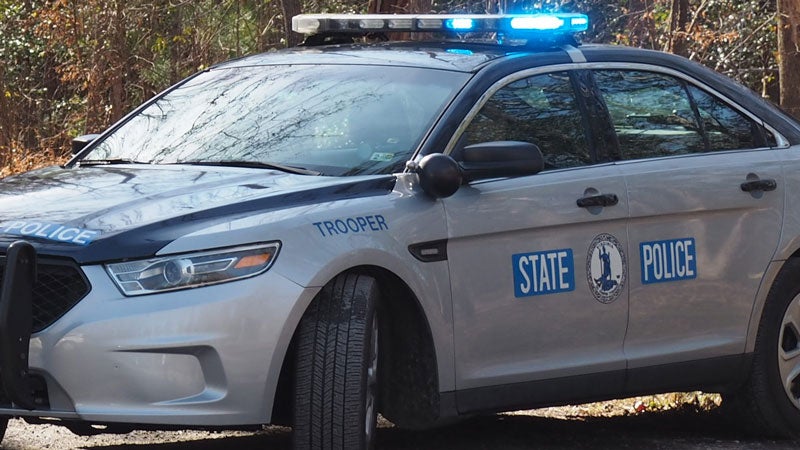Edwards preserves business in pandemic
Published 5:51 pm Tuesday, August 11, 2020

- Keith Roberts, wholesale manager for Edwards Virginia Smokehouse, displays one of the company's hams available at the Surry retail location. Roberts said the company has made many adjustments to its business model in response to the coronavirus pandemic.
Add fine food tastings to the list of experiences that have gone virtual due to the pandemic.
It was the first event of its type for Surry-based Edwards Virginia Smokehouse in the business’s 90-plus year history, according to Keith Roberts, the company’s wholesale manager. Six people participated.
Everyone “thought it was great,” Roberts said. “And it was. I thought it went very well.”
Participants were sent product samples, descriptions and recipes for smoked sausage and bacon a week ahead of the virtual meeting. Then, the day of the event, everyone shared their ham-tasting experience virtually.
“So everybody’s sitting there on Zoom with their piece of ham, and we’re talking about the ham, the production and whether it was the younger country ham and then moving up to the 18-month-aged Surryano ham,” Roberts said.
Foodies, restaurateurs and home chefs have long sung the praises for Edwards’ pork products. The company’s signature items include Surryano ham, sweet ham, country ham, sausage and bacon. It’s run by third-generation family member Sam Edwards III and his son, Sam Edwards IV.
When the coronavirus pandemic first reached crisis level, both of the company’s ham shops — one in Surry on Rolfe Highway and the other in Williamsburg — temporarily closed. They have reopened with heightened protocols in place to protect the health of staff and guests.
Roberts said it’s been an adjustment to shift his focus from wholesale and foodservice to consumer retail. He said the company is fortunate to “have a very loyal following” of customers in every business sector — in-store, website, restaurant and wholesale.
“I was in touch with everybody to let them know that we have initiatives in place, but we’re here for you and we will do whatever we can to support you during this time.”
“It’s been a slow process back for the ham shops,” Roberts continued. “Needless to say, our restaurant business dropped off significantly across the country with so many places closing up. Our grocery business actually picked up. And the website just saw some insane growth.”
Before the pandemic, Roberts, who has decades of food industry experience, said about 70% of his business was working with restaurants. Pivoting to serve a different sector of the industry “was challenging but also fun at the same time,” he said. “I’d love to say sales and business is always a walk in the park. It isn’t. You always have to adapt, you always have to be willing to change to market conditions.”
Edwards begins preparing hams in December, January and February, “so by the time COVID hit, our hams were just hitting age,” Roberts said. “So I let everybody know we have inventory and we can help you.”
As some of the health-related lockdowns have been relaxed, “we are starting to see some food service customers come back. There’s still a long way to go, no question about that, before they’ll be able to get back up to 100%.”
When meat shortages started to affect grocery stores, Edwards was positioned to help bridge the gap.
“Our grocery chains, the companies that I work with, whether it be Wegmans or Kroger or Publix, the large grocery stores, I reached out to them and reached out and let them know that we do have product,” Roberts said.
From mid-September through the end of the year, the company’s focus will be on grocery stores and “that’s always the case, making sure that we have inventory, which we’re not too concerned about.”
As a small business, Edwards has freedom and flexibility that big companies don’t, Roberts said.
“We’ve been in business since 1926, so you figure we’ve seen the Great Depression, multiple armed conflicts, all of which caused their own economic upturns, downturns. The recession of ’08. We basically have a binder for every kind of catastrophe.” In addition, the company also survived a catastrophic 2016 fire that destroyed a vintage smokehouse.
As a small company, “we can change our dynamic, we can change our mindset, we can change our direction pretty quickly,” he said. The question, he said, is “are you willing to put forth the effort to do it?”




